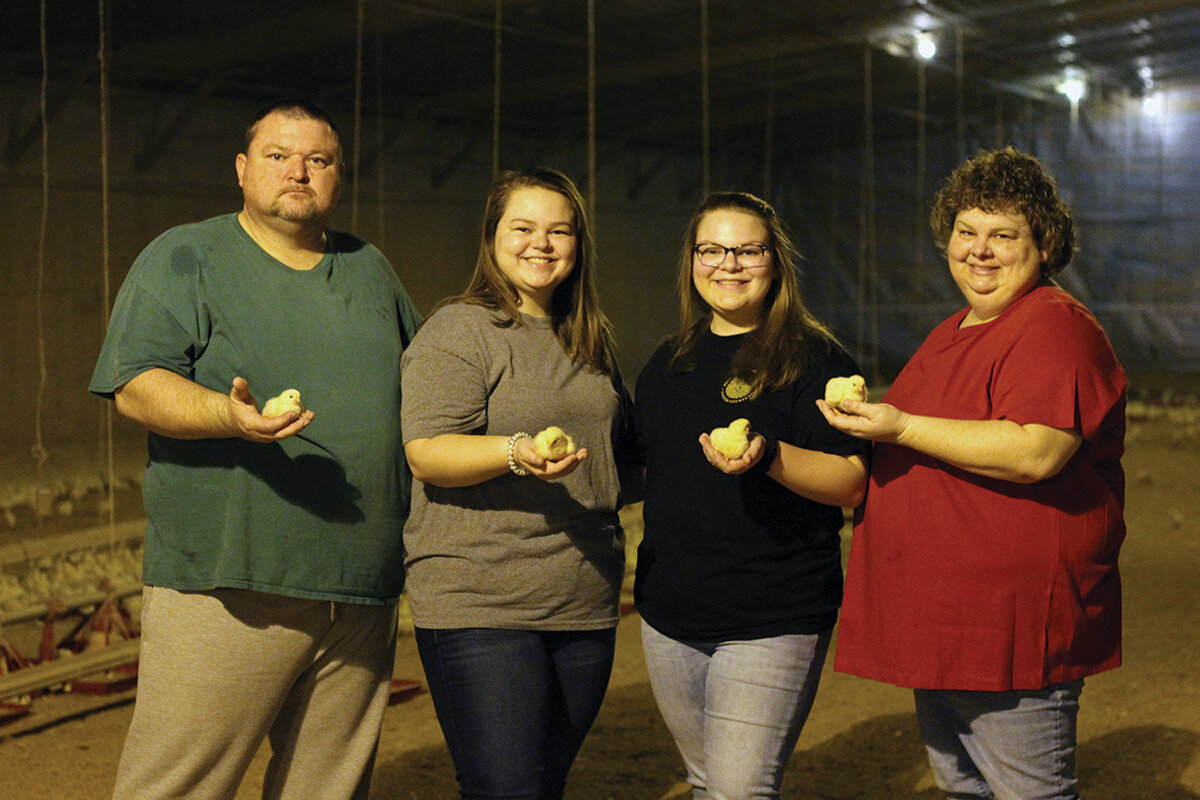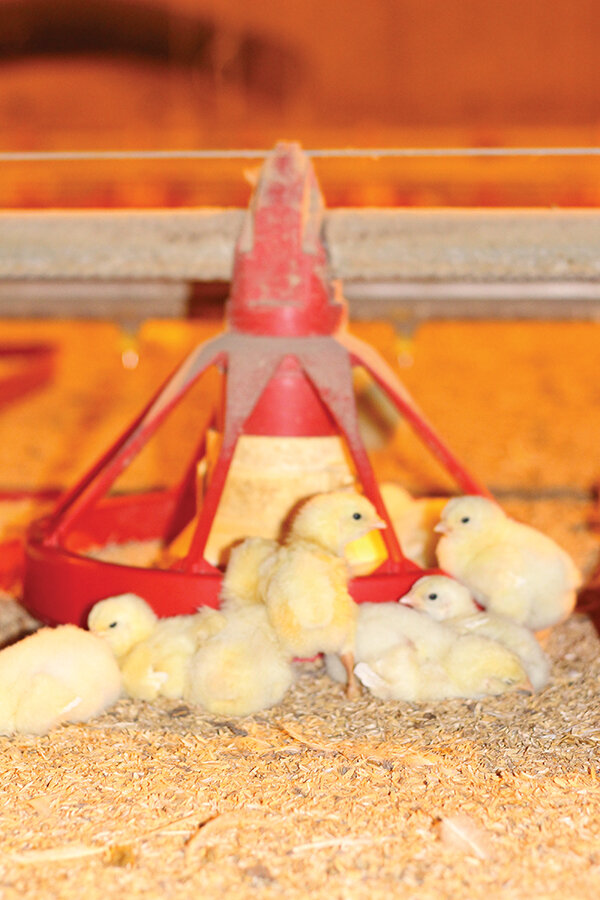Where Your McNuggets Come From
Article provided by Kentucky Soybean Board, by Rae Wagoner
When asked how he feels about growing chickens on contract for Tyson, Tim Morrison said “I’m lovin’ it,” with a grin. The reason for that grin is apparent when one learns that all the chickens grown on Morrison Farms – and that’s a LOT of chickens – are processed in nearby Obion County, Tennessee, for use in McDonald’s restaurants all over the world.
“There are three Tyson plants that process chicken just for McDonald’s,” Morrison said, “and we happen to live really close to one of them.” Other birds grown for the Tyson chicken you find in your local grocery store and for other restaurant clients are processed elsewhere, he said.
Morrison and his wife, Deena, built 4 barns on the farm in southern Graves County that she bought as a single woman of just 23. “I had just gotten out of college and I had my first teaching job,” she recalled. “My dad called and said ‘there’s 40 acres down the road that just came up for sale, and you need to buy it.’” Being raised on a farm near Wingo, Deena knew that farmland is rarely a poor investment, so she applied for an FSA loan for minorities. “Back then,” she said, “women were considered a minority!”
Deena had owned the farm for about 4 years when she and Tim married, and Tyson had just come to town. “Tim was working at Waymatic in South Fulton, where they made concession trailers. It was a good job and he liked it, but he wanted to be more independent. We had helped my brother in his chicken barns, so we had an idea of what we were getting into building houses of our own.”
The Morrisons’ first four houses went up in the fall of 1999, and two more followed five years later. “We practice an all-in, all-out operation,” Tim said. That means that all six of their houses get freshly-hatched chicks on the same day, then about 54 days later, the birds will weigh in at about 7.45 pounds, which means they are ready to be processed. During that time, Tim added, they will collectively eat 1,600,000 pounds of feed, and the birds in EACH HOUSE will drink 2,200 gallons of water every 24 hours per house... one drop at a time.
So, back to the definition of a LOT of chickens. “We have six houses, and each house gets 20,500 birds, so that’s 123,000 birds at a time. We flip houses five times a year, so a little more than 600,000 birds a year,” he said.
So, how much care do those chickens need? Tim and Deena, with help from their daughters Caroline and Maddy, walk the houses daily. It is important to walk the houses in order to visually inspect the flock, Tim said, and to remove the small amount of birds that inevitably don’t make it. “Our livability rate is high,” Deena said, “and we take pride in taking good care of our birds and the area in which we grow them. We like for things to be neat and clean, and we want to be good neighbors.”
The Morrisons observe best management practices, which includes “de-caking” between flocks. This means that the top layer of bedding (usually rice hulls) is removed, along with the waste from that flock. This nutrient-rich poultry litter is then sold to row-crop farmers who use it as fertilizer. A fresh new layer of rice hulls is put down between flocks, and once a year, the Morrisons do a complete clean-out of all six houses.
In addition, they’ve upgraded their ventilation system. Deena said that, “even though we have pretty much the ideal set-up, with no neighbors and living at the end of a dead-end road, we realize that nobody wants to smell a chicken barn. We do everything we can to keep things nice and clean and well-ventilated. That’s better for the birds, it’s better for those of us who work in the barns, and it’s better for our neighbors.”
Aside from the regular daily chores that come with raising chickens, the Morrisons are particularly busy on days that they get new chicks, and the days they get the barns ready to “go out,” as it’s called. Before the Tyson catch crew comes in to remove the birds from the houses, the waterers have to be raised up to the ceilings and feeders moved out of the way so that the catch crew has unrestricted access to the birds.
The second generation of Morrison Poultry Farms started young. Caroline, 19, and Maddy, 15, have been helping in the chicken houses since they were “old enough to walk good,” Deena said. “They’ve been with us in this since they were babies, and they know that we love it. It’s made us a good living, and it’s given our girls a good work ethic, even though they grumble about it.” She added that she and Tim now pay the girls to work in the barns, rather than them having off-farm jobs.
Caroline is a senior at Murray State University, and said that some of her college friends aren’t really sure what to make of a girl who raises broiler chickens on such a large scale. “It’s just normal to them, though,” Deena said. “They’ve been working in this all their lives, and they don’t know anything else.”
Whatever the standard may be, a look at the “trophy wall” in the Morrison home tells the casual observer that they’re doing something right. The Morrisons have won the Kentucky Family Farm Environmental Excellence Award, given by the Kentucky Poultry Federation, three times, and that’s in addition to the numerous Grower Awards they’ve won through Tyson. They won a prestigious “Golden Feather” award from Tyson in 2018, and were honored at the national level in 2016 and 2018 with the Family Farm Environmental Excellence Award, given by the U.S. Poultry and Egg Association.
While Deena’s off-farm job as a math teacher with Fulton County Schools keeps her busy during the school year, Tim is full-time on the farm year-round. He said he greatly prefers raising chickens during the summer, because in the summer he has fewer things to worry about. “In the summer, I have to keep an eye on the cool cells and the fans,” he said. “But in the winter, there’s a whole lot more that can go wrong. There are water lines that could freeze, snow and ice on the roads keeping the feed truck from getting here or my chickens from getting picked up on time, or even snow and ice on the roof of the houses that could cause a collapse.”
From the looks of things around Morrison Poultry, Tim, Deena and their daughters have everything well in hand, no matter the season. When asked a parting question, “what do you want people to know about your operation,” Deena was quick to reply. “We care. We care about these birds, and we raise healthy animals. We feed our family Tyson products because we know the standards that we and our fellow growers uphold, and we want you to know that they’re a safe choice for your family, too.”


